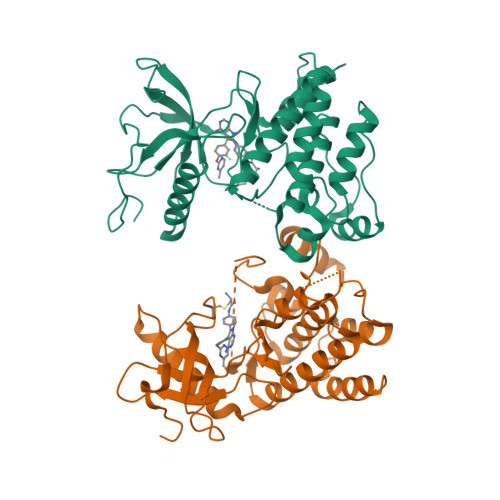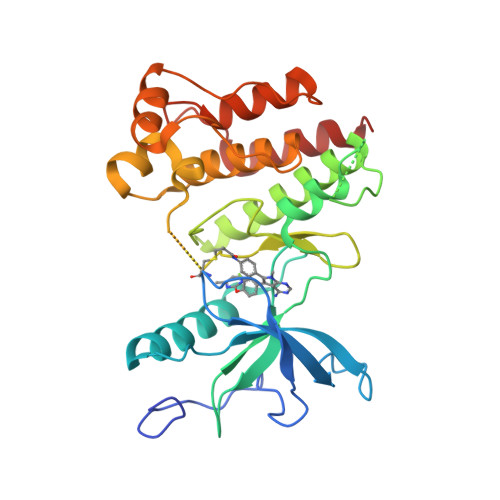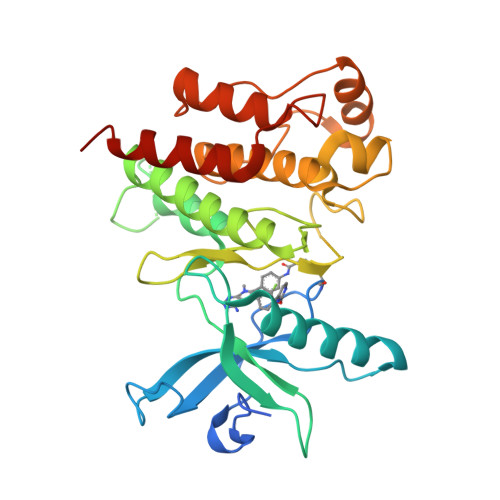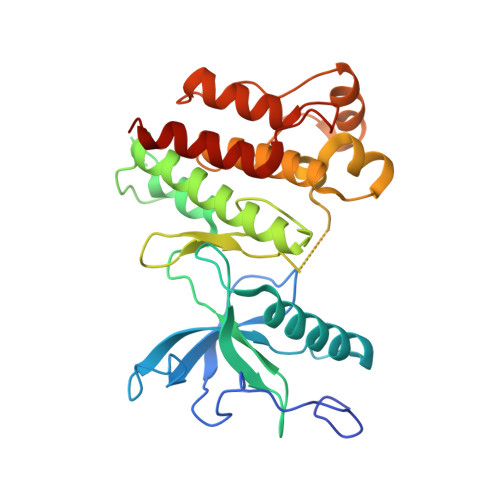RLY-4008, the First Highly Selective FGFR2 Inhibitor with Activity across FGFR2 Alterations and Resistance Mutations.
Subbiah, V., Sahai, V., Maglic, D., Bruderek, K., Toure, B.B., Zhao, S., Valverde, R., O'Hearn, P.J., Moustakas, D.T., Schonherr, H., Gerami-Moayed, N., Taylor, A.M., Hudson, B.M., Houde, D.J., Pal, D., Foster, L., Gunaydin, H., Ayaz, P., Sharon, D.A., Goyal, L., Schram, A.M., Kamath, S., Sherwin, C.A., Schmidt-Kittler, O., Jen, K.Y., Ricard, F., Wolf, B.B., Shaw, D.E., Bergstrom, D.A., Watters, J., Casaletto, J.B.(2023) Cancer Discov 13: 2012-2031
- PubMed: 37270847
- DOI: https://doi.org/10.1158/2159-8290.CD-23-0475
- Primary Citation of Related Structures:
8STG - PubMed Abstract:
Oncogenic activation of fibroblast growth factor receptor 2 (FGFR2) drives multiple cancers and represents a broad therapeutic opportunity, yet selective targeting of FGFR2 has not been achieved. Although the clinical efficacy of pan-FGFR inhibitors (pan-FGFRi) validates FGFR2 driver status in FGFR2 fusion-positive intrahepatic cholangiocarcinoma, their benefit is limited by incomplete target coverage due to FGFR1- and FGFR4-mediated toxicities (hyperphosphatemia and diarrhea, respectively) and the emergence of FGFR2 resistance mutations. RLY-4008 is a highly selective, irreversible FGFR2 inhibitor designed to overcome these limitations. In vitro, RLY-4008 demonstrates >250- and >5,000-fold selectivity over FGFR1 and FGFR4, respectively, and targets primary alterations and resistance mutations. In vivo, RLY-4008 induces regression in multiple xenograft models-including models with FGFR2 resistance mutations that drive clinical progression on current pan-FGFRi-while sparing FGFR1 and FGFR4. In early clinical testing, RLY-4008 induced responses without clinically significant off-isoform FGFR toxicities, confirming the broad therapeutic potential of selective FGFR2 targeting. Patients with FGFR2-driven cancers derive limited benefit from pan-FGFRi due to multiple FGFR1-4-mediated toxicities and acquired FGFR2 resistance mutations. RLY-4008 is a highly selective FGFR2 inhibitor that targets primary alterations and resistance mutations and induces tumor regression while sparing other FGFRs, suggesting it may have broad therapeutic potential. See related commentary by Tripathi et al., p. 1964. This article is featured in Selected Articles from This Issue, p. 1949.
Organizational Affiliation:
The University of Texas MD Anderson Cancer Center, Houston, Texas.




















